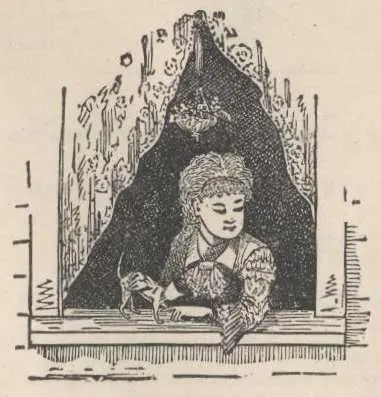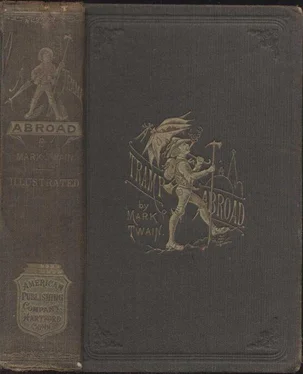Mark Twain - A Tramp Abroad
Здесь есть возможность читать онлайн «Mark Twain - A Tramp Abroad» весь текст электронной книги совершенно бесплатно (целиком полную версию без сокращений). В некоторых случаях можно слушать аудио, скачать через торрент в формате fb2 и присутствует краткое содержание. Жанр: Классическая проза, Юмористическая проза, на английском языке. Описание произведения, (предисловие) а так же отзывы посетителей доступны на портале библиотеки ЛибКат.
- Название:A Tramp Abroad
- Автор:
- Жанр:
- Год:неизвестен
- ISBN:нет данных
- Рейтинг книги:5 / 5. Голосов: 1
-
Избранное:Добавить в избранное
- Отзывы:
-
Ваша оценка:
- 100
- 1
- 2
- 3
- 4
- 5
A Tramp Abroad: краткое содержание, описание и аннотация
Предлагаем к чтению аннотацию, описание, краткое содержание или предисловие (зависит от того, что написал сам автор книги «A Tramp Abroad»). Если вы не нашли необходимую информацию о книге — напишите в комментариях, мы постараемся отыскать её.
A Tramp Abroad — читать онлайн бесплатно полную книгу (весь текст) целиком
Ниже представлен текст книги, разбитый по страницам. Система сохранения места последней прочитанной страницы, позволяет с удобством читать онлайн бесплатно книгу «A Tramp Abroad», без необходимости каждый раз заново искать на чём Вы остановились. Поставьте закладку, и сможете в любой момент перейти на страницу, на которой закончили чтение.
Интервал:
Закладка:

I do not see any wisdom in building a monster cask to hoard up emptiness in, when you can get a better quality, outside, any day, free of expense. What could this cask have been built for? The more one studies over that, the more uncertain and unhappy he becomes. Some historians say that thirty couples, some say thirty thousand couples, can dance on the head of this cask at the same time. Even this does not seem to me to account for the building of it. It does not even throw light on it. A profound and scholarly Englishman—a specialist—who had made the great Heidelberg Tun his sole study for fifteen years, told me he had at last satisfied himself that the ancients built it to make German cream in. He said that the average German cow yielded from one to two and half teaspoons of milk, when she was not worked in the plow or the hay-wagon more than eighteen or nineteen hours a day. This milk was very sweet and good, and a beautiful transparent bluish tint; but in order to get cream from it in the most economical way, a peculiar process was necessary. Now he believed that the habit of the ancients was to collect several milkings in a teacup, pour it into the Great Tun, fill up with water, and then skim off the cream from time to time as the needs of the German Empire demanded.
This began to look reasonable. It certainly began to account for the German cream which I had encountered and marveled over in so many hotels and restaurants. But a thought struck me—
"Why did not each ancient dairyman take his own teacup of milk and his own cask of water, and mix them, without making a government matter of it?'
"Where could he get a cask large enough to contain the right proportion of water?"
Very true. It was plain that the Englishman had studied the matter from all sides. Still I thought I might catch him on one point; so I asked him why the modern empire did not make the nation's cream in the Heidelberg Tun, instead of leaving it to rot away unused. But he answered as one prepared—
"A patient and diligent examination of the modern German cream had satisfied me that they do not use the Great Tun now, because they have got a BIGGER one hid away somewhere. Either that is the case or they empty the spring milkings into the mountain torrents and then skim the Rhine all summer."
There is a museum of antiquities in the Castle, and among its most treasured relics are ancient manuscripts connected with German history. There are hundreds of these, and their dates stretch back through many centuries. One of them is a decree signed and sealed by the hand of a successor of Charlemagne, in the year 896. A signature made by a hand which vanished out of this life near a thousand years ago, is a more impressive thing than even a ruined castle. Luther's wedding-ring was shown me; also a fork belonging to a time anterior to our era, and an early bootjack. And there was a plaster cast of the head of a man who was assassinated about sixty years ago. The stab-wounds in the face were duplicated with unpleasant fidelity. One or two real hairs still remained sticking in the eyebrows of the cast. That trifle seemed to almost change the counterfeit into a corpse.
There are many aged portraits—some valuable, some worthless; some of great interest, some of none at all. I bought a couple—one a gorgeous duke of the olden time, and the other a comely blue-eyed damsel, a princess, maybe. I bought them to start a portrait-gallery of my ancestors with. I paid a dollar and a half for the duke and a half for the princess. One can lay in ancestors at even cheaper rates than these, in Europe, if he will mouse among old picture shops and look out for chances.
APPENDIX C.
The College Prison
It seems that the student may break a good many of the public laws without having to answer to the public authorities. His case must come before the University for trial and punishment. If a policeman catches him in an unlawful act and proceeds to arrest him, the offender proclaims that he is a student, and perhaps shows his matriculation card, whereupon the officer asks for his address, then goes his way, and reports the matter at headquarters. If the offense is one over which the city has no jurisdiction, the authorities report the case officially to the University, and give themselves no further concern about it. The University court send for the student, listen to the evidence, and pronounce judgment. The punishment usually inflicted is imprisonment in the University prison. As I understand it, a student's case is often tried without his being present at all. Then something like this happens: A constable in the service of the University visits the lodgings of the said student, knocks, is invited to come in, does so, and says politely—
"If you please, I am here to conduct you to prison."
"Ah," says the student, "I was not expecting it. What have I been doing?"
"Two weeks ago the public peace had the honor to be disturbed by you."
"It is true; I had forgotten it. Very well: I have been complained of, tried, and found guilty—is that it?"
"Exactly. You are sentenced to two days' solitary confinement in the College prison, and I am sent to fetch you."
STUDENT. "O, I can't go today."
OFFICER. "If you please—why?"
STUDENT. "Because I've got an engagement."
OFFICER. "Tomorrow, then, perhaps?"
STUDENT. "No, I am going to the opera, tomorrow."
OFFICER. "Could you come Friday?"
STUDENT. (Reflectively.) "Let me see—Friday—Friday. I don't seem to have anything on hand Friday."
OFFICER. "Then, if you please, I will expect you on Friday."
STUDENT. "All right, I'll come around Friday."
OFFICER. "Thank you. Good day, sir."
STUDENT. "Good day."
So on Friday the student goes to the prison of his own accord, and is admitted.
It is questionable if the world's criminal history can show a custom more odd than this. Nobody knows, now, how it originated. There have always been many noblemen among the students, and it is presumed that all students are gentlemen; in the old times it was usual to mar the convenience of such folk as little as possible; perhaps this indulgent custom owes its origin to this.
One day I was listening to some conversation upon this subject when an American student said that for some time he had been under sentence for a slight breach of the peace and had promised the constable that he would presently find an unoccupied day and betake himself to prison. I asked the young gentleman to do me the kindness to go to jail as soon as he conveniently could, so that I might try to get in there and visit him, and see what college captivity was like. He said he would appoint the very first day he could spare.
His confinement was to endure twenty-four hours. He shortly chose his day, and sent me word. I started immediately. When I reached the University Place, I saw two gentlemen talking together, and, as they had portfolios under their arms, I judged they were tutors or elderly students; so I asked them in English to show me the college jail. I had learned to take it for granted that anybody in Germany who knows anything, knows English, so I had stopped afflicting people with my German. These gentlemen seemed a trifle amused—and a trifle confused, too—but one of them said he would walk around the corner with me and show me the place. He asked me why I wanted to get in there, and I said to see a friend—and for curiosity. He doubted if I would be admitted, but volunteered to put in a word or two for me with the custodian.
He rang the bell, a door opened, and we stepped into a paved way and then up into a small living-room, where we were received by a hearty and good-natured German woman of fifty. She threw up her hands with a surprised "ACH GOTT, HERR PROFESSOR!" and exhibited a mighty deference for my new acquaintance. By the sparkle in her eye I judged she was a good deal amused, too. The "Herr Professor" talked to her in German, and I understood enough of it to know that he was bringing very plausible reasons to bear for admitting me. They were successful. So the Herr Professor received my earnest thanks and departed. The old dame got her keys, took me up two or three flights of stairs, unlocked a door, and we stood in the presence of the criminal. Then she went into a jolly and eager description of all that had occurred downstairs, and what the Herr Professor had said, and so forth and so on. Plainly, she regarded it as quite a superior joke that I had waylaid a Professor and employed him in so odd a service. But I wouldn't have done it if I had known he was a Professor; therefore my conscience was not disturbed.
Читать дальшеИнтервал:
Закладка:
Похожие книги на «A Tramp Abroad»
Представляем Вашему вниманию похожие книги на «A Tramp Abroad» списком для выбора. Мы отобрали схожую по названию и смыслу литературу в надежде предоставить читателям больше вариантов отыскать новые, интересные, ещё непрочитанные произведения.
Обсуждение, отзывы о книге «A Tramp Abroad» и просто собственные мнения читателей. Оставьте ваши комментарии, напишите, что Вы думаете о произведении, его смысле или главных героях. Укажите что конкретно понравилось, а что нет, и почему Вы так считаете.












